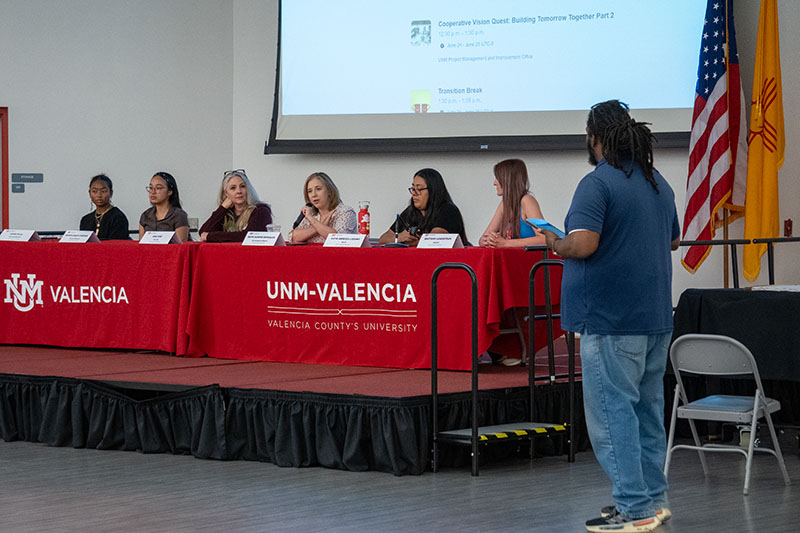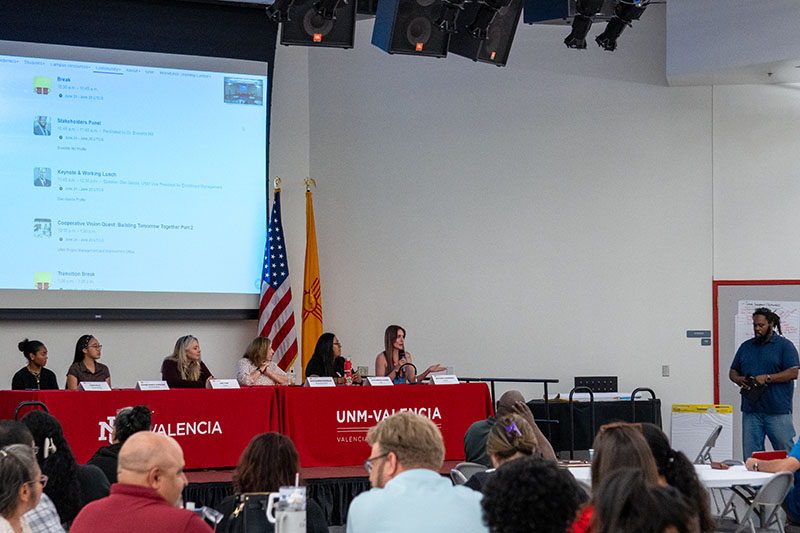Stakeholders' Panel
Perspectives Rooted in Community
The Stakeholders’ Panel brought together a cross-section of the UNM-Valencia community—two current students, a staff member, an alumna, a faculty member, and a Development Board member—for an honest conversation about the college’s impact, challenges, and future. Moderated by Dr. Everette Hill, the discussion focused on five key questions, uncovering deep personal stories, actionable feedback, and a shared commitment to growth.
Summary
- Rated 3.95 average
- Most Resonating Perspective: Student (25 responses), followed by Faculty/Staff (12).
- Recurring themes: concerns about the experiences of student employees, including calls for improved communication and greater professionalism, community engagement gaps, desire for more academic options locally, and lack of action despite repeated input.
- Student voices were viewed as authentic and often highlighted overlooked issues.

Impact on Lives and Community
All panelists highlighted the campus’s transformative role in their lives, particularly its affordability, safety, and small class sizes. First-generation college students spoke about receiving support that helped them succeed, while the faculty and board members emphasized the importance of relationships and access. One alumna shared how UNM-Valencia allowed her to earn two degrees without the stress or cost of moving away, and a faculty member noted how the campus has become the center of her family and professional life.
Strengthening Support for Rural Families
Both students called for bachelor’s degree programs to be offered on-site, reducing the need to commute to Albuquerque. The staff member emphasized the importance of flexible class and advising hours to support nontraditional students, while others noted the need for clearer transfer pathways to avoid unnecessary coursework. The Development Board member advocated for increased scholarship opportunities and better promotion of student success stories to attract community investment.
Deepening Community Connections
Panelists expressed a need for increased visibility and outreach. Suggestions included enhancing the college’s social media presence, attending more community events, and involving current students in peer-to-peer dual credit outreach. One student recalled first learning about the campus at a local park event. Food trucks, community partnerships, and early engagement with K–12 schools were repeatedly mentioned as ways to bridge the gap between campus and community.
A Vision for the Next 10 Years
Panelists envisioned a campus that is vibrant, inclusive, and deeply embedded in the local landscape. They hoped to see expanded academic offerings, partnerships with new regional employers (like the upcoming hospital), and a shift toward a learning community mindset. Students also expressed interest in contributing to campus marketing and activities, but noted hesitancy due to communication gaps and a lack of invitation.
Common Themes from Panel Responses
- Need for Respect and Recognition: Student employees called for improved communication and professionalism.
- Desire for More Program Offerings: Panelists, particularly students and alumni, expressed a desire for more local academic offerings to reduce the need for travel.
- Importance of Community Presence: Many panelists viewed UNM-Valencia as a hub of opportunity and wanted to see stronger, more visible engagement with the Valencia County community.
- Safety and Belonging: Despite critiques, several panelists affirmed they feel safe and connected on campus, suggesting a strong foundation for deeper inclusion.

Resonating Perspectives
- When asked whose perspective resonated most:
- 58% cited students, underscoring how impactful their honest feedback was.
- Faculty/staff followed, with respondents appreciating their transparency.
- Community and employer voices were acknowledged, though fewer participants identified with them directly.
Closing Reflections and Moving Forward
The Stakeholders’ Panel surfaced both meaningful appreciation and persistent tensions. While participants welcomed the opportunity to hear diverse voices, some noted that concerns seemed to gain more traction when voiced by external or high-profile sources, highlighting the need for more inclusive internal feedback mechanisms. This disconnect raised concerns about inclusivity in decision-making and the lack of visible follow-through on past input.
The panel made it clear that students want to be heard, not managed. Their insights offer a valuable lens for evaluating campus culture, policy, and strategy. A particularly meaningful moment came when a student worker shared concerns about how they are supported, highlighting the importance of respect and clear communication. It sparked a broader reflection on how all campus members are welcomed, supported, and empowered.
If these voices are truly valued, future planning must consistently involve students, create safe channels for open feedback, and translate community concerns into tangible, visible change. Students are not just recipients of services—they are active contributors to the culture and future of UNM-Valencia.
